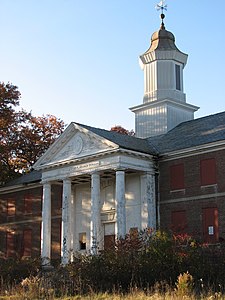Metropolitan State Hospital (Massachusetts)
| Metropolitan State Hospital | |||||||||||||||||||||||||||||
|---|---|---|---|---|---|---|---|---|---|---|---|---|---|---|---|---|---|---|---|---|---|---|---|---|---|---|---|---|---|
 Administration Building | |||||||||||||||||||||||||||||
 | |||||||||||||||||||||||||||||
| Geography | |||||||||||||||||||||||||||||
| Location | Massachusetts, United States | ||||||||||||||||||||||||||||
| Organization | |||||||||||||||||||||||||||||
| Funding | Public hospital | ||||||||||||||||||||||||||||
| Type | Specialist | ||||||||||||||||||||||||||||
| Services | |||||||||||||||||||||||||||||
| Speciality | Psychiatric hospital | ||||||||||||||||||||||||||||
| History | |||||||||||||||||||||||||||||
| Opened | 1927 | ||||||||||||||||||||||||||||
| Closed | 1992 | ||||||||||||||||||||||||||||
| Links | |||||||||||||||||||||||||||||
| Lists | Hospitals in Massachusetts | ||||||||||||||||||||||||||||
NRHP
| |||||||||||||||||||||||||||||
The Metropolitan State Hospital was an American public hospital for the mentally ill, on grounds that extended across parts of Waltham, Lexington, and Belmont, Massachusetts. Founded in 1927, it was at one time the largest and most modern facility of its type in Massachusetts.[2] It was closed in January 1992 as a result of the state's cost-cutting policy of closing its mental hospitals and moving patients into private and community-based settings. The main complex of buildings has subsequently been redeveloped into apartments. The hospital campus was listed on the National Register of Historic Places 1994. The property also housed the Gaebler Children's Center for mentally ill youth.
History
The Metropolitan State Hospital's founding originated in legislation passed by the state in 1900, mandating that the state take over care for the mentally ill, which had in some cases only been handled at the local level. Site selection for a facility in the Greater Boston area, where the demand for additional space was the greatest, took until 1926. Ground was broken on the hospital buildings in 1926, and the facility was formally dedicated in 1928, and opened on October 29, 1930. Construction continued until 1935, with some stages under Works Progress Administration supervision. The complex cost $1.8 million and was considered the most modern mental health facility in the country.[3]
The hospital's design was reflective of the third stage of development of facilities for the mentally ill, after the Kirkbride Plan and the cottage/colony system. It also reflected the advent of roads rather than railroads as major transport arteries, as it was not located near any railroad lines. Its buildings were designed in the Colonial Revival style by Gordon Robb, with landscaping, based on principles laid down by the Olmsted Brothers, by R. Hayward Loring. At its peak, the facility had a patient population of nearly 2,000.[4] The grounds included the Met-Fern cemetery, a burial site it shared with the Fernald School.[5]
In 1978, Metropolitan State patient Anne Marie Davee was murdered by another patient, Melvin W. Wilson.[6][7][8][9]
The facility was closed in 1992 during a deinstitutionalization movement when most state mental hospitals in Massachusetts shut down and patients were placed in smaller group settings. The property was unused until redevelopment began in 2007.[3]
Redevelopment and open space
In 2007, some of the complex's residential wards located in the Lexington portion of the property were adaptively repurposed for conventional residential use as part of larger apartment complex development known as Avalon at Lexington Hills. The Administration Building, pictured above, stands in Waltham. A number of the former hospital buildings were incorporated into the new development including the former Kline Hall which now houses marketing offices, Lexington's cable access station, an auditorium and a fitness area. A large concrete relief from the medical-surgical building has been installed outside the building as a memorial to the state hospital. The extensive wooded grounds are open to the public and protected in perpetuity from further development. The trails include part of the Western Greenway open space, connecting to the Rock Meadow conservation area in Belmont to the east and, according to plans, in 2009, to the Middlesex County Hospital area to the west.[3]
See also
- National Register of Historic Places listings in Waltham, Massachusetts
- National Register of Historic Places listings in Lexington, Massachusetts
- National Register of Historic Places listings in Middlesex County, Massachusetts
References
- ^ "National Register Information System". National Register of Historic Places. National Park Service. March 13, 2009.
- ^ Richard A. Hogarty (2002). Massachusetts politics and public policy: studies in power and leadership. University of Massachusetts Press. p. 115. ISBN 978-1-55849-362-9.
- ^ a b c "Area AA — Metropolitan State Hospital". Lexington Comprehensive Cultural Resources Survey. Lexington Historical Commission. Retrieved 8 May 2018.
- ^ "NRHP nomination for Metropolitan State Hospital". Commonwealth of Massachusetts. Retrieved 2017-02-21.
- ^ "Metfern Cemetery". www.temblast.com.
- ^ "Metropolitan State Hospital - ANN DAVEE". Met State Hospital.
- ^ "The dismembered body of a Metropolitan State... " Boston Globe Aug 12, 1980
- ^ "Backman: Hospital Murder Data Missing" Boston Globe Aug 15, 1980
- ^ "Mental patient held in dismemberment murder". St. Joseph Gazette. Aug 13, 1980. Retrieved 29 October 2013.
External links
- Metropolitan State Hospital
- Massachusetts Department of Mental Health
- Massachusetts State Hospitals, hdl:2452/625416 – via State Library of Massachusetts electronic repository. (Various documents).
- Local History & Genealogy - Waltham Room, with information on the closing of the hospital
- Waltham Land Trust: The Western Greenway
- The area in the OpenStreetMap shows trails.
- Hospital buildings completed in 1927
- Hospitals established in 1927
- Psychiatric hospitals in Massachusetts
- Hospitals in Middlesex County, Massachusetts
- Buildings and structures in Waltham, Massachusetts
- Buildings and structures in Lexington, Massachusetts
- Belmont, Massachusetts
- Historic districts in Middlesex County, Massachusetts
- National Register of Historic Places in Middlesex County, Massachusetts
- National Register of Historic Places in Waltham, Massachusetts
- Defunct hospitals in Massachusetts
- Historic districts on the National Register of Historic Places in Massachusetts
- Hospitals disestablished in 1992



